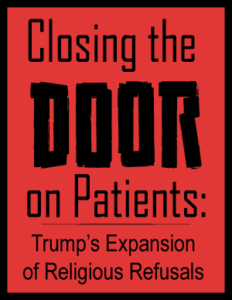 In the last year, we have seen the Trump administration repeatedly attack and sabotage programs that ensure individuals and families struggling to make ends meet have the health coverage they need. While Trump and his administration seek to hurt individuals enrolled in the Medicaid program and in Marketplace plans, Trump is also gutting access to care, especially reproductive health care. His latest attack on health care is a proposed rule that would expand federal religious refusal laws to the point that nearly any person or institution involved in the delivery of health care, or even an employer, could refuse to provide health care services based on religious or moral beliefs.
In the last year, we have seen the Trump administration repeatedly attack and sabotage programs that ensure individuals and families struggling to make ends meet have the health coverage they need. While Trump and his administration seek to hurt individuals enrolled in the Medicaid program and in Marketplace plans, Trump is also gutting access to care, especially reproductive health care. His latest attack on health care is a proposed rule that would expand federal religious refusal laws to the point that nearly any person or institution involved in the delivery of health care, or even an employer, could refuse to provide health care services based on religious or moral beliefs.
A number of state and federal religious exemptions allow providers to opt out of medically established standards of care that individuals normally expect to receive. These refusals have mostly focused on contraception, sterilization, and abortion. According to the Guttmacher Institute, 45 states allow individual health care providers to refuse to provide abortion services and 43 states permit health care institutions, such as hospitals, to deny abortion care. Twelve states allow certain providers to deny services related to contraception.
These refusals already deny women and others medically necessary care that is based in science and rigorous research. Information, counseling, referral and provisions of contraceptive and abortion services are part of the standard of care for a range of common medical conditions including heart disease, diabetes, epilepsy, lupus, obesity, and cancer. For example, the American Diabetes Association recommends that women with diabetes use contraception until they are ready to become pregnant. Abortion may be recommended treatment for preeclampsia and eclampsia, certain forms of cardiovascular disease, and complications for chronic conditions. Many of these conditions disproportionately harm women of color. For instance, the rate of preeclampsia is 61 percent higher for Black women than for white women.
Existing exemptions have allowed doctors and health care facilities, such as hospitals, to refuse care, but the proposed rule goes beyond current restrictions. Because the proposed rule is vague, it may allow anyone involved in the delivery of health care, and specifically not just providers, to refuse to provide help if it leads to an objected service. For example, it seems possible under the proposed rule that a scheduler could deny services to a patient if they were seeking to schedule an appointment for contraceptive counseling or an IUD insertion. The proposed rule also may have a chilling effect on what information providers will give to their patients.
Due to the breadth of the proposed rule, providers may think that they can deny any health care service because of a patient’s identity or personal characteristics or for any number of reasons. Already, transgender individuals often face harassment and violence when seeking care. Twenty-nine percent of transgender persons have been denied care by a provider because of their perceived or actual gender identity. People living with disabilities may be denied services by a case manager or a home health aide. One man with HIV was refused care by six nursing homes before his family was finally forced to relocate him to a nursing home 80 miles away. This rule, if finalized, will make it even easier to deny services because of a provider’s bias and prejudice. It will become harder, if not impossible, for individuals who already endure discrimination and lack financial resources, to get the care they need.
Moreover, the proposed rule does not offer protections for providers who want to provide reproductive health services or other forms of health care not in spite of, but because of their religious or moral beliefs. This rule is another disconcerting example of the Trump administration privileging a very narrow view of Christian beliefs to harm women, people of color, LGBTQ individuals, and others who struggle to access care.
For example, last fall, the Trump administration allowed more employers to drop contraceptive coverage for their employees because of their religious or moral beliefs. In fact, many communities of faith oppose Trump’s view of religious liberty. Sixty percent of Catholic likely voters do not believe that “Catholic hospitals that take taxpayer dollars should be allowed to use religious beliefs as a reason to withhold certain medical procedures and medications.” More than seven in ten Unitarian Universalists, Jewish Americans, and unaffiliated Americans oppose small business owners, which includes many health care provider offices, denying services to gay and lesbian individuals on the basis of religious beliefs.
The public overwhelmingly rejects Trump’s idea to hurt individuals when they are most vulnerable. More than 200,000 members of the public have submitted comments claiming that health care providers should put patients first and ensure that people can go to their providers without fear or concern that they will be denied care. I hope Trump listens.
To see the National Health Law Program’s comments on the proposed rule, go here.
